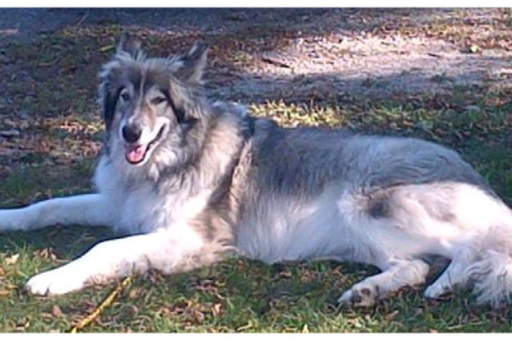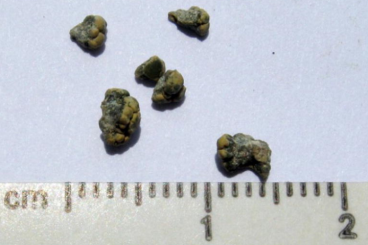
Click to view submission information
Canine 2,8-dihydroxyadenine (2,8-DHA) urinary stones are caused by an autosomal recessive genetic disorder. The disorder is a result of a mutation in the adenine phosphoribosyltransferase (APRT) gene, which encodes an enzyme that is critical in the metabolism of dietary purines. A deficiency in APRT results in excessive 2,8-DHA in the urine. This increases the risk for formation of bladder or kidney stones and can cause significant kidney disease.
Who gets it?
2,8-DHA is among the most rare types of canine urinary stones. It has been reported in dogs with ancient breed origins, such as the Siberian Husky, Tamaskan, and Native American Indian Dog (which is derived from the Alaskan Malamute, Siberian Husky, German Shepherd Dog, and Chinook). We have also identified this stone type in wolves.
What are the clinical signs?

Canine 2,8-DHA stones can form in the kidneys or bladder. This causes irritation that may manifest as straining to urinate, frequent urination, urgency with urination, blood in the urine, or life-threatening urinary obstructions. Microscopic crystals can also accumulate in the kidney and cause kidney disease. Patients can present at any age. Though many patients have serious consequences, some remain asymptomatic. Males appear to be more likely to form stones than females.
How is it managed?
Once diagnosed, stones can be treated surgically or with other removal techniques, but the disease tends to recur without additional intervention. High fluid intake is important, along with a low purine diet. Therapeutic veterinary low purine diets are available by prescription. Egg, nuts, and dairy are generally low purine sources of protein; foods with high purine content such as liver, kidney, bacon, and most seafood should be avoided. Treatment with a medication called allopurinol may also reduce the risk for 2,8-DHA stone formation. Genetic test results can be used to help guide medical management of affected dogs, identify dogs at risk even before they form stones, and to inform breeding decisions.
Submitting a sample
Step 1 - Select instructions for your sample type
Blood sample protocol (pdf)
Cheek swab protocol (pdf)
Dew claw & tail docking protocol (pdf)
Semen sample protocol (pdf)
Step 2 - Complete your submission form(s)
Step 3 - Fees & Payment
1-3 dogs - $65 each
4 or more - $58 each
Need cheek swabs?
Cheek swabs are not included in the purchase price. Links to several purchasing options are available within the cheek swab protocol (pdf).
Step 4 - Ship your sample(s)
Result interpretation
Scientific references
An APRT mutation is strongly associated with and likely causative for 2,8-dihydroxyadenine urolithiasis in dogs.
Furrow E, Pfeifer RJ, Osborne CA, Lulich JP
Mol Genet Metab. 2014 Mar;111(3):399-403. doi: 10.1016/j.ymgme.2013.12.002. Epub 2013 Dec 11.